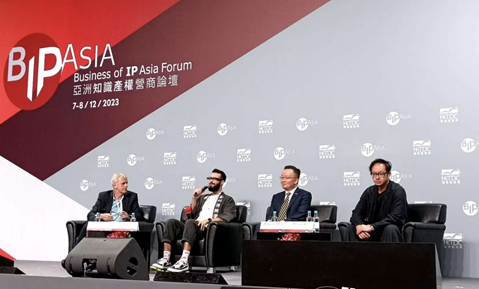By Prime Sarmiento in Hong Kong | chinadaily.com.cn |

DJ Clark, multimedia director for China Daily Asia Pacific (first from the left), moderates a panel discussion co-organized by China Daily in Hong Kong on Dec 8. The panel discussion is part of the Business of Intellectual Property Asia Forum held at the Hong Kong Convention and Exhibition Center. [Photo by Prime Sarmiento/chinadaily.com.cn]
Existing laws on intellectual property can help protect artists from possible copyright infringement and other IP-related threats brought by the rise of generative artificial intelligence, a forum heard on Friday.
"We have international laws, like the Berne Convention on copyright, but local law enforcement differs (in various jurisdictions)," Nicholas Chan Hiu-fung, chairman of the Legal Committee of the Hong Kong General Chamber of Commerce and partner of global law firm Squire Patton Boggs, said in a panel discussion on "Art and Copyright: Addressing the Unique IP Challenges in the Art Industry".
Chan was alluding to the Berne Convention for the Protection of Literary and Artistic Works — a global treaty that provides artists and other creators with the means to control how their works are used. Parties to the Berne Convention have agreed to pass laws in their own countries and territories that protect the copyright of their own nationals and residents.
The panel discussion, co-organized by China Daily and moderated by DJ Clark, multimedia director for China Daily Asia Pacific, is part of the Business of Intellectual Property Asia Forum. The forum, was held from Dec 7 to 8 at the Hong Kong Convention and Exhibition Center, was organized by the Hong Kong SAR Government and the Hong Kong Trade Development Council.
Chan said that application of international copyright law like the Berne Convention will also depend on local law interpretation or court cases. He added that in China, regulations on generative AI requires traceability and "protecting peoples data sovereignty".
China issued an interim regulation on the management of generative artificial intelligence (AI) services. The regulation, which went into effect on August 15, states that China will encourage innovative applications of generative AI technology. But regulators will exercise classified and grading supervision on generative AI services, requiring service providers to fulfill the obligations of online information security, including protecting netizens' personal information, and to take precautions to prevent under-age users from becoming addicted to such services.
Chan also advised artists to protect their work by employing tools like using a digital watermark. "There are things you could do to prove that (this artwork is) from you … (so that) you can prove to the court that someone copied from you if that is the case."
For Henry Chu, a Hong Kong-based new media artist, artists are "meant to be influenced and to influence others. So I think when we go to a museum to see work and we get influenced, we get inspired."
He said it is "very difficult to find evidence of copying" one's artwork and would rather let his gallerist solve the problem so that he can focus on creating.
"So my way to avoid (of having my artwork being copied) is to create something better. If (my artwork is) too simple to (be) copied, maybe it's just too common. So I need to do something that is very difficult to replicate," Chu said.
Edward Eremyan, CEO and founder of TELEPORT and a prominent figure in digital art, immersive experiences and experiential marketing, believes AI is a tool that artists can use to boost their creativity.
"There are also some artists that are using robots for example, to paint their works. That's another thing you know, this is a physical real art piece, but then it's produced by a robot, but also that robot needs to be programmed. And there is also a lot of creative process behind seeing a robot paint, it's also very fascinating, right? So to me, it's really there is no competition here and there is no conflict. Because if you want to be an artist, you can be an artist and AI is not really your enemy. You can use it for inspiration. You can use it for ideas, you can use it for sketching and prototyping and anything," he said.